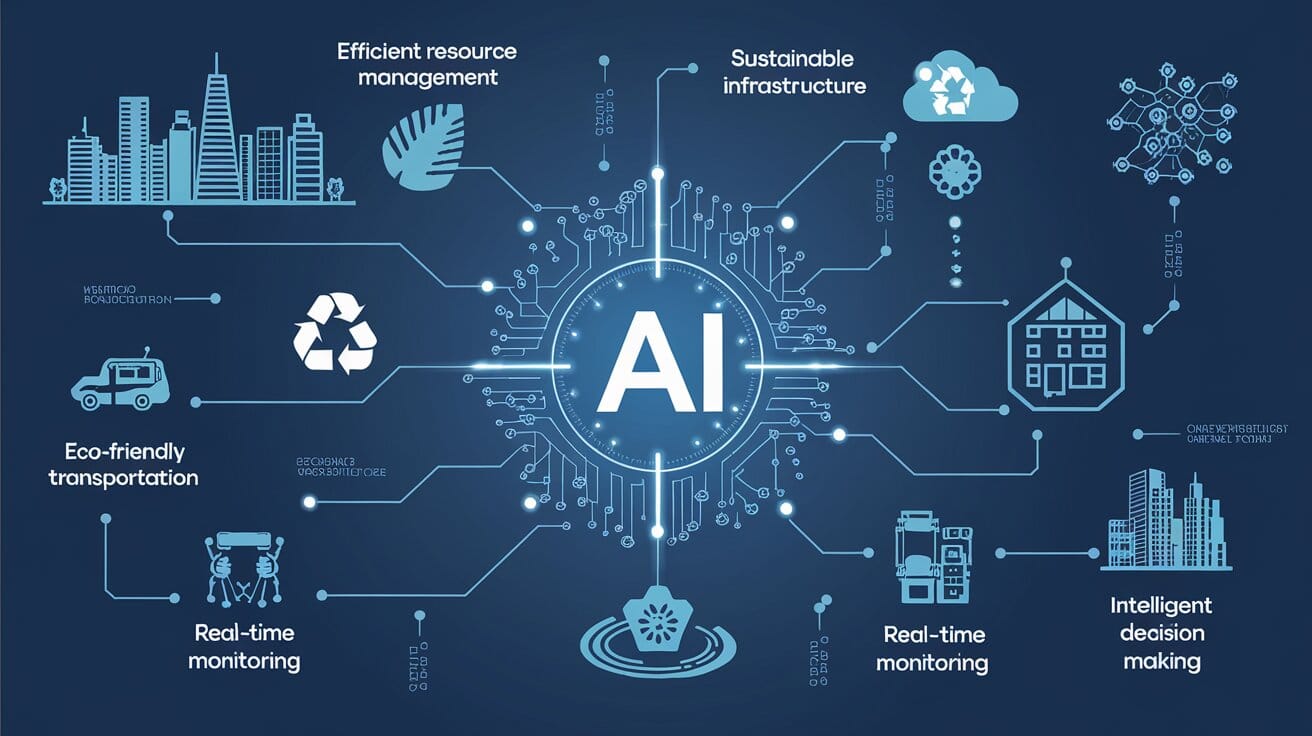

Are you ready to disrupt with AI? Join our Hackathon today! Click to Register
By WebOsmotic Team | Published on October 14, 2024
Summarize Article

Table of Contents
ToggleWith urbanization on the rise across all nations, sustainable urban planning is a major concern. In this context, the concepts of AI smart cities surface, which are incorporated with cutting-edge technology and data management systems to be an effective, environmentally friendly, and people-centered approach to city development. Smart city is a term that most people have heard but few understand, especially the place of artificial intelligence in the equation. In this blog, we will focus on different aspects of the role of AI in smart cities. We will explore AI in smart cities examples and how they help develop sustainability and efficiency in the urbanization process.
The definition of a smart city is that it is an urban area that has made use of digital technologies to improve the standard of living of its citizens. This means deploying IoT, big data, and AI in healthcare management are advanced infrastructure and has minimal effects on the environment. Services such as traffic management systems, waste management, and energy saving are all associated with smart cities because they are data-centered to enhance the physical environment. However, the most important advancement comes in the form of AI and smart cities.
What is AI? AI Is the operating system of the smart city. Because of its capacity to process considerable information almost instantaneously, it helps cities in decision-making at an improved rate. Now let’s look more closely at AI in smart cities and how it’s changing cities for the better.
Traffic control is one of the most important domains where AI is utilized in smart cities. Traffic in the city creates frustration, waste, time, and resources which in turn increases the level of pollution. Using predictive modeling and several sources of information such as cameras, sensors, and GPS, AI enables cities to smoothen the traffic movement.
Proper disposal of waste is another big area addressed by smart cities to be called greener cities. AI-powered waste management systems incorporate the use of different types of sensors and analytics to keep an eye on the waste accumulation levels in bins within a radius of the city. Example of smart cities:- robots that discriminate between recycling materials and those for disposal are being used in some countries, to facilitate the campaign of recycling more materials.
Energy management is one of the most viable aspects of AI in smart cities development. Thanks to AI, smart grids can deliver electricity more efficiently in real-time balancing demand and supply. AI’s ability to predict energy consumption trends can help in better distribution of energy to minimize wastage as well as avoid blackouts.
In many countries, water scarcity is becoming an important issue. Therefore, smart cities are using AI tools to be able to control this resource more efficiently. AI can monitor water used, identify leakages, and forecast water usage considering parameters such as past data and current weather conditions.
In AI smart cities, it is possible to implement water sensors that switch off the systems in the event of a detected leakage thereby preventing wastage. It is possible to predict the periods of high water demand and readjust the distribution of water thereby reducing water losses. Thus, the available water resources in the city are preserved properly.
Investing in smart cities has numerous benefits but one stands out, protecting urban dwellers. There are surveillance systems powered by Artificial Intelligence that can recognize and report suspicious activities in real-time avoiding possible security breaches. These systems employ an AI mechanism that sifts through footage and looks for any anomalies such as criminal or even accident behavior thus aiding in a faster response.
Many global cities today are using AI in the construction of smart cities for enhanced growth and peace. Below are some of the smart cities that are inspiring such trends.
As well as in many other areas of society, Singapore has also managed to use a smart city concept in urban architecture and development. The city-state has since embarked on planning the AI-enabled traffic management system aimed at enhancing road safety and alleviating road congestion. AI technologies are also used to make power use in structures efficient in furtherance of Singapore’s aspiration of being an eco-friendly city.
Barcelona is one more smart city where the implementation of how do smart cities aim to be sustainable. The city has adopted smart waste management solutions powered by artificial intelligence, which controls the level of litter and the routing of rubbish trucks. Moreover, artificial intelligence manages illuminations on streets by controlling the brightness depending on the sunlight present and cuts power usage.
The city of Copenhagen has a policy-impacting commitment to maintain CO2 emissions at 2025 levels, where AI is expected to be a key factor. What the city does use AI for is the management of the energy grid, enabling the maximization of associates working at this level within the renewable build-outs and structure openings energy distribution. Moreover, it is also the AI that contributes to the reduction of traffic in Copenhagen contributing to more cleanliness in the city and more sustainable development as a whole.
The application of Artificial Intelligence in the functional components of smart cities is not just a matter of cutting edge technology; it is an essential element of smart urban planning. With the changing definition of a smart city, the importance of artificial intelligence in such cities will increase with time.
It is true that for this reason, urban planners seek to adopt artificial intelligence because it promotes the sustainability goals of cities in the face of anticipated challenges in the future. The greening of the aspirations is possible and it is already being achieved through the use of artificial intelligence.
Unlock exclusive insights and expert knowledge delivered straight to your inbox